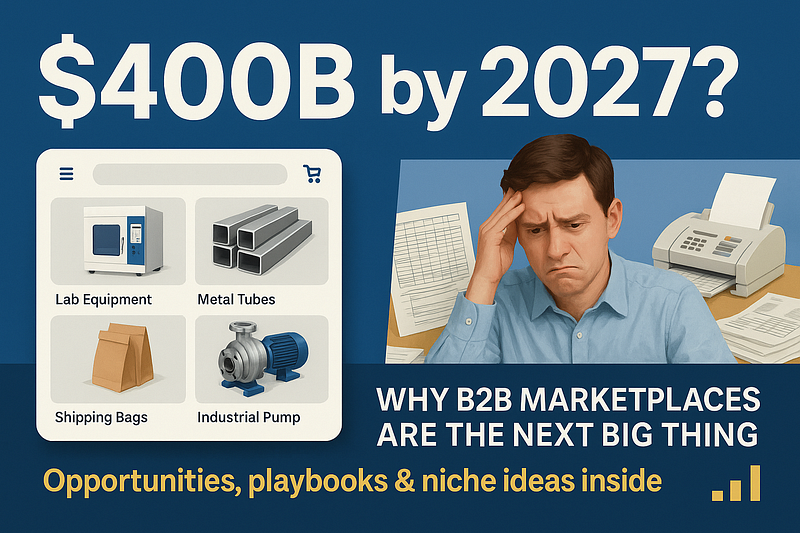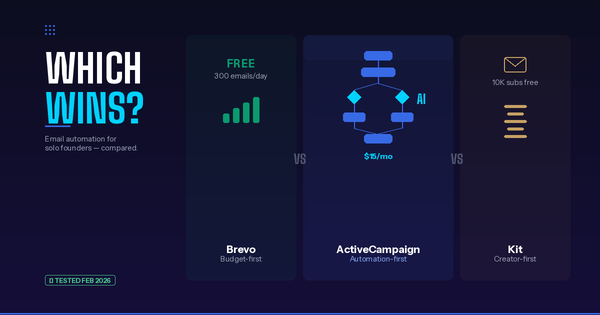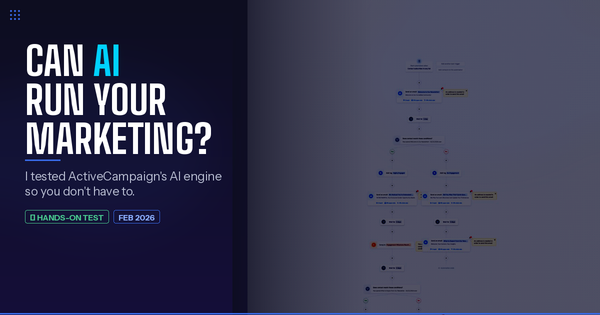The Rise of B2B Marketplaces: Why They’re Growing Fast, Where Opportunities Are, and How to Build…
How B2B Marketplaces Are Quietly Revolutionizing Commerce — And How You Can Build One in 90 Days

The Rise of B2B Marketplaces: Why They’re Growing Fast, Where Opportunities Are, and How to Build One
Who this is for:
- Founders looking for a smart new business to start.
- Marketers wanting to open new growth channels.
- Investors exploring fast-growing, overlooked industries.
B2B (business-to-business) marketplaces are changing how companies buy and sell products. They’ve grown from $56 billion in 2021 to nearly $200 billion in 2024. But even now, they make up only 10% of the total B2B e-commerce space.
That means there are still huge opportunities to build new platforms.
How Big is the Market?
B2B marketplaces bring together many sellers and buyers on one website or platform. Instead of a buyer visiting one supplier’s website, they can compare options from many suppliers in one place.
Marketplaces are growing about twice as fast as other online sales channels in B2B. They’re expected to reach 15% of all B2B online sales by 2027.
Why this matters:
- Buyers want better tools: They like fast quotes, easy comparisons, and user-friendly design.
- Suppliers want more sales: It’s harder to stand out on your own website. Marketplaces give access to more buyers.
- Startups can win by focusing on niche areas: There are still many industries with no good marketplace.
Why These Platforms Are Growing Fast
Here are five reasons B2B marketplaces are winning:
- Paperwork is moving online — Tasks like price quotes, purchase orders, and payments can now be done digitally.
- They get stronger over time — More sellers attract more buyers. More buyers attract more sellers.
- Clear pricing — Buyers like seeing prices upfront instead of having to email or call.
- Cheaper to operate — Marketplaces save time and effort for both buyers and sellers.
- More trust — Secure payments, reviews, and verification systems help build confidence.
Success Stories You Can Learn From
All of these focused on one industry, solved real problems, and made buying easier.
How to Find a Great Market to Enter
4 Steps to Spot a Good Niche:
- Look for industries with big spending and little tech — These often have slow, offline buying.
- Talk to people — Interview buyers and sellers. Ask about their biggest daily headaches.
- Search online — If the top results are just old directories or PDF catalogs, there’s room for improvement.
- Check the market size — You don’t need a billion-dollar industry, just one big enough to build a business.
Real Examples:
- Lab Equipment Rentals: ~$10B industry, but most pricing is hidden, and quotes are slow.
- Eco-Friendly Packaging: Big demand, but it’s hard for small buyers to find certified suppliers.
How to Start One: A Simple 90-Day Plan
By the end of 90 days: aim for 50 buyers, 10 sellers, and 1 daily transaction.
How These Businesses Make Money
Marketplaces usually make money in two ways:
- Take a small cut from each transaction (5–20%).
- Charge monthly fees for advanced tools (usually $200–$2,000/month).
Example goals for your business:
- Get back your customer acquisition costs (ads, calls, time) within 12 months.
- Earn 3x what you spend on getting a customer.
- Keep most of what you make — aim for high profit margins.
Mixing transaction fees and subscriptions makes your income more stable.
Problems to Watch Out For (And Solutions)
Final Tips
- B2B marketplaces are growing fast, but still have room to grow.
- You don’t need to reinvent the wheel — just find a messy process and make it simple.
- Start with a small audience and build from there.
- Use simple tools. You don’t need a big team or tons of funding.
- Build trust, focus on one industry, and keep improving.
Big things start small. This is your chance to build something that really matters.





